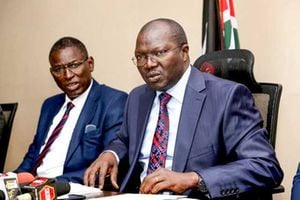Traders in NCIC hotspot counties scale down business amid election violence fears

From left: Internal Security Secretary Wilson Njega, European Ambassador (EU) to Kenya H.E. Amb. Henriette Geiger, National Cohesion and Integration Commission (NCIC) Chairman Rev. Dr. Samuel Kobia and European Center for Electoral Support (ECES) Strategic and Advisory Committee Vice-President Amb. Filiberto Sebregondi pose for a photo after the launch of Pro-Peace Kenya Project on May 13, 2022 at Radisson Blu Hotel. The project is aimed at the promotion of peace and cohesion in Kenya by preventing and mitigating electoral conflicts.
What you need to know:
- National Cohesion and Integration Commission (NCIC) classified Uasin Gishu, Nakuru, Kericho, Nairobi and Mombasa as hotspots as the August General Election draws nearer.
- Most real estate investors and traders in the region have hired additional private guards to bolster security.
- Traders are taking precautionary measures, including cutting their stock.
Counties named as election violence hotspots have started registering declining business, as traders start to scale down their operations due to fears of losses arising from instability.
This is despite a pledge by security teams that they were on high alert to ensure peaceful campaigns.
The National Cohesion and Integration Commission (NCIC) classified Uasin Gishu, Nakuru, Kericho, Nairobi and Mombasa as hotspots as the August General Election draws nearer.
Traders are taking precautionary measures, including cutting the stock they buy.
“It is our desire that the region continues to experience peace unlike in the past when chaos erupted during or after elections, hurting business activities,” said David Kosgei, who runs a building and construction business in Eldoret.
Hiring private security
Most real estate investors and traders in the region have hired additional private guards to bolster security.
“I have to put in place proper measures to avoid a repeat of what happened during the 2007/2008 post-election violence when I lost property worth millions of shillings due to chaos,” said Amos Kamau, a trader in Eldoret.
He has hired more security guards to protect his business premises.
Turbo, Kesses, Burnt Forest and the Kerio Valley are regarded as violence hotspots and additional security personnel have been deployed to flush out criminals believed to be out to capitalise on the elections to harass residents.
“The prevailing political stability is conducive for our business activities away from fears of violence before the election results are announced,” said James Kiptoo, a trader at the Eldoret wholesale market.
Investor confidence
Kenya National Chamber of Commerce and Industry (KNCCI) Uasin Gishu chapter Chairman Willy Kenei said the named counties stand to suffer investor confidence, cash flow challenges and mobility of goods and services, impacting negatively to growth and expansion of business.
“Fears of election-related chaos have proved to be counterproductive to business activities. It affects transport and logistic services of entrepreneurs and general revenue generation for counties,” said Mr Kenei while noting that Uasin Gishu has enjoyed peace for the last 10 years.
During Madaraka Day celebrations on Wednesday, Uasin Gishu County Commissioner Stephen Kihara said security patrols had been intensified in crime-prone areas to crack down on hate-mongers and individuals promoting violence.
“We have identified the hideouts for criminals and we are flushing them out while at the same time monitoring those out to promote hate speech. What we need is peace building and not acts of violence,” said Mr Kihara.
Hotspots being monitored
Rift Valley Regional Coordinator Maalim Mohamed said security personnel are monitoring events in areas viewed as hotspots.
He asked political candidates to observe the Public Order Act in their campaigns, including notifying police of any planned rallies so that they can provide security.
“Parallel meetings will not be tolerated and all aspirants have a responsibility to maintain law and order in their campaigns,” added Mr Maalim, who called on residents to report to the police any cases of threats for necessary action to be taken against perpetrators.
“Our security officers are on the ground monitoring utterances made by politicians and other individuals and those found fuelling [ethnic hatred] and animosity will face the full force of the law,” he said.
Some politicians in the region are under scrutiny for propagating hate speech as elections approach.





